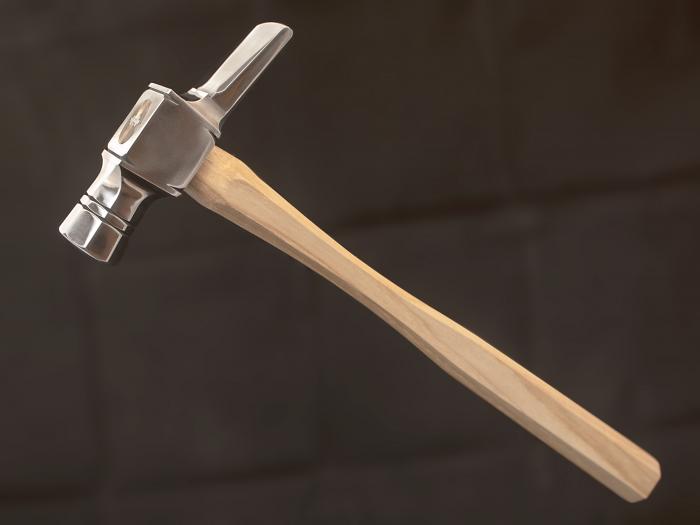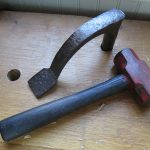We may receive a commission when you use our affiliate links. However, this does not impact our recommendations.

I’ll begin with the top-notch U.S.-made hammers that were introduced to the market in recent years.
Kings County Cabinetmaker’s Hammer
At the top of the list stands the Gramercy Tools “Kings County” hammer. This is a 9.5 oz tool that looks like the Victorian ancestor of both the French/German and the Warrington hammers (that I wrote about here). Graham Haydon tells me that in the U.K., it resembles the Exeter hammer.
Created by Joel Moskowitz of Tools For Working Wood and based on some English specimens from the 19th century, this is a masterpiece of high-quality engineering embellished with the finest of details. At a price of $250, this is for sure the best and most expansive hammer I know of. Read more about Joel’s hammer in this post by Christopher Schwarz.
Lie-Nielsen Hammer
Thomas Lie-Nielsen also makes a beautiful hammer. It is a lightweight Warrington-pattern tool that is better suited for delicate work than for heavy nailing. While it is not currently in production, Lie-Nielsen Toolworks anticipates resuming production soon.
Warrington Hammers
There are many manufacturers and plenty of brand names that offer this hammer.
Among the best are: Picard (Germany) and Footprint (U.K.). I believe that Stanley and Record stopped making the Warrington hammers.
Picard seems to make the best Warringtons, and the most affordable place I’ve found for them in the U.S. is The Hammer Source. You can also shop for them at Lee Valley and Woodcraft, but they don’t maintain a steady supply of all sizes.
Robert Larson carries the 300 Gr (10.5 oz) German-made Warrington – I believe it is the Picard.
eBay is another big source for Warringtons. Some U.K. suppliers on eBay offer compatible shipping fees for sending them across the pond.
The French/German Jointer hammer.
Picard and Gedore (Germany), Facom (France) and Stubai (Austria) manufacture them and export them to the U.S.. My favorites are Picard and Gedore. I’ve not had the chance to try a Facom. And I used to own a Stubai, but I found the handle to be too thin for my hand. But as I have written in the past, one can thicken and mould a thin handle to conform to his or her hand by wrapping hockey tape around it. (At the bottom of this entry you can watch a video clip showing how Rob Cosman uses the Hockey tape technique on a some tool handles.)
This is a partial list of vendors that carry some of the French/German hammers.
1. http://www.traditionalwoodworker.com/searchprods.asp
2. http://www.diefenbacher.com/hammersmallets.htm
3. http://www.kctoolco.com/SearchResults.asp?Search=joiner%27s+hammer
4. Amazon carries the Stubai hammers too.
There are also a few Indian, Taiwanese and Chinese manufacturers that make the Warringtons and the French/German hammers, but I have not owned or tried them so I can’t give you my opinion on them.
To read more about hammers check out this Chris Schwarz post, “When All Your Problems Look like Hammers.”
Here are some supplies and tools we find essential in our everyday work around the shop. We may receive a commission from sales referred by our links; however, we have carefully selected these products for their usefulness and quality.






![How To Sharpen A Gouge [Video]](https://www.popularwoodworking.com/wp-content/uploads/bfi_thumb/dummy-transparent-olcy6s63it1p9yp7uhusjas7c8kahafrhg9su7q9i0.png)


It looks like you have US retailer covered, but I wanted to mention a successful experience I had with Dieter Schmid’s online store. They stock Picard’s Warrington €18 and French style for €14. The rub is that shipping to the US starts at €30. They had quite a few other things I needed at good prices so all in all it made sense for me. It took about 15 calendar days to arrive via DHL and USPS. I am not at all affiliated with that business but wanted to mention a good source and give some idea of shipping times, since I had no idea when I ordered.
Ditto on the need for appropriate hammers. I lust for the Gramercy hammer but alas, I found two similar hammer heads rummaging through a flea market tool vendor’s “possibles” box. Their shapes unmistakable and both had for five dollars in total. A few minutes exposed to the whirring wire wheel and a dunk in some blueing solution and voila! The smallest now sports a handle shaped from a straight grained piece of cocobolo and the other a piece of spalted maple. So, for a few weekends of rummaging, a picky woodworker can make do quite well, if they are up for a search.